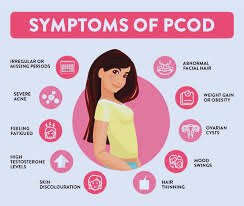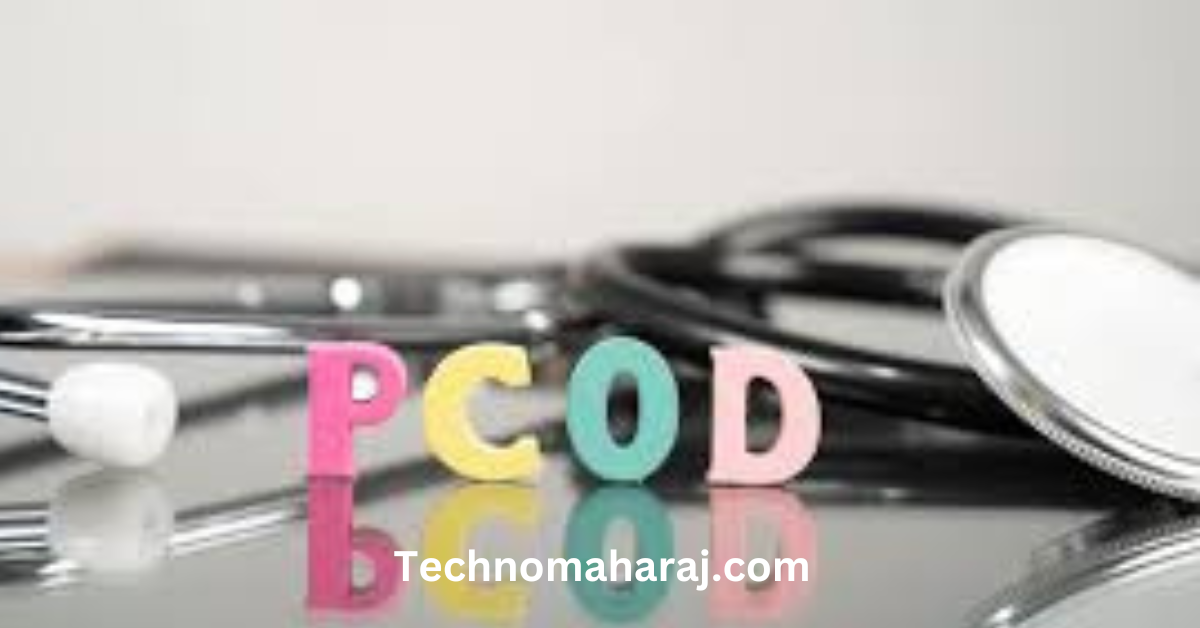Polycystic ovary disease (PCOD) is a prevalent condition that affects many women globally. Characterized by the presence of multiple cysts in the ovaries, it causes various symptoms such as irregular periods, weight gain, acne and infertility.

Although there is no definitive cure for , it is possible to manage and significantly reduce its symptoms. This comprehensive guide explores holistic approaches, medical treatments, dietary changes, and lifestyle adjustments that can help effectively manage .
Understanding What Actually PCOD Is?
What is PCOD?
Hormonal imbalances in PCOD, or polycystic ovary disease, cause numerous small cysts to develop on the ovaries. These cysts are actually immature eggs that are not released during ovulation. Over time, these eggs accumulate and cysts form, causing the ovaries to enlarge.
Symptoms of Having PCOD ?
- Irregular Menstrual Periods- Women with PCOD experience irregular or missed periods due to hormonal imbalances that affect ovulation.
- Weight Gain- Many women with PCOD experience weight gain, often related to insulin resistance.
- Acne and Oily Skin- Hormonal imbalances can increase androgen levels, which can lead to acne and oily skin.
- Hirsutism- Excessive hair growth on areas such as the face, chest and back due to increased androgen levels.
- Hair thinning- Some women notice thinning hair on their scalp.
- Infertility- can make pregnancy difficult due to irregular ovulation.
- Fatigue- Chronic fatigue and low energy levels are common.
Causes of PCOD!
- Heredity- PCOD often runs in families, suggesting a genetic component.
- Insulin resistance- Many women with PCOD have insulin resistance, which leads to elevated insulin levels and increased androgen production.
- Hormonal imbalances-high levels of androgens and luteinizing hormone (LH) and low levels of sex hormone-binding globulin (SHBG) are common.
- Inflammation – Chronic low-grade inflammation is the common in women with the PCOD.
Diagnosis of PCOD
- Medical History- Detailed history including menstrual patterns and family history of PCOD.
- Physical examination – checking for symptoms such as excessive hair growth, rashes and weight gain.
- Blood tests – measuring hormone levels including testosterone, LH, FSH and insulin levels.
- Ultrasound- visualization of ovaries to check for cysts.
Managing of PCOD.
A holistic approach.
- A holistic approach combines a variety of lifestyle changes with diet, exercise, mental health and natural remedies to effectively manage PCOD symptoms.
- Diet
- Low Glycemic Index Diet- Consuming foods with a low glycemic index can help control insulin levels. Focus on whole grains, legumes, vegetables and fruits.
- Balanced Nutrition- Ensure a balanced intake of protein, healthy fats and fiber. Avoid refined carbohydrates and sugary foods.
- Regular Meals – Eat small, frequent meals to maintain blood sugar levels.
- Anti-inflammatory foods – Include foods rich in omega-3 fatty acids (such as fish, flaxseed and walnuts), antioxidants (berries, green leafy vegetables) and spices such as turmeric and ginger.
- Do Exercise
- Regular physical activity – Engage in regular physical activity, such as brisk walking, running, cycling or swimming, for at least 30 minutes most days of the week.
- Strength Training – Include strength training exercises to build muscle mass, which can help improve insulin sensitivity.
- Yoga and Pilates – These practices can help reduce stress levels and improve overall well-being.
- Mental Well-Being
- Stress Management – Practice stress-reduction is the techniques such as meditation, deep breathing exercises, and mindfulness.
- Adequate sleep- Ensure you get 7-8 hours of restful sleep each night.
- Mental Health Support – Seek help from a mental health professional if needed.
Medical Treatments
- Several medical treatments can help effectively manage PCOD symptoms
- Hormonal birth control
- Oral contraceptives- These can help regulate the menstrual cycle, lower androgen levels, and manage acne and hirsutism.
- Anti-androgen
- Medications- Spironolactone and other anti-androgen medications can reduce excessive hair growth and acne.
- Metformin
- Insulin sensitizer- Metformin, commonly used for type 2 diabetes, can improve insulin resistance and help regulate menstrual cycles.
- Fertility treatment
- Clomiphene Citrate (Clomid)-Stimulates ovulation in women trying to conceive.
- Gonadotropins – injectable hormones that stimulate the ovaries to produce multiple eggs.
- Surgical options
- Laparoscopic Ovarian Drilling (LOD) – A surgical procedure that induces ovulation by removing part of the ovary.
Ayurvedic and traditional remedies
- Ayurvedic and traditional remedies can offer natural ways to manage PCOD symptoms.
- Herbal remedies
- Cinnamon- Helps improve insulin sensitivity.
- Spearmint can lower T-androgen levels and help manage hirsutism.
- Fenugreek can help regulate blood sugar levels and improve insulin sensitivity.
- Licorice can help balance root-hormones.
- Ayurvedic methods
- Dietary adjustments- Following an Ayurvedic diet based on your body type can help manage symptoms.
- Yoga and meditation- Regular practice of yoga and meditation can help reduce stress and improve overall well-being.
Innovative and emerging treatments
- New and emerging treatments offer promise for managing PCOD.
- Research and clinical trials
- Inositol supplements- Myo-inositol and D-chiro-inositol have shown promise in improving insulin sensitivity and regulating menstrual cycles.
- Ovarian rejuvenation- Experimental treatments such as ovarian rejuvenation are being studied for their potential benefits.
- Technology based solution
- Apps and Wearables – Health apps and wearable devices can help monitor symptoms and manage lifestyle changes.
A comprehensive lifestyle overhaul
- Comprehensive lifestyle modification is important for the long-term management of PCOD.
- Regular check-ups
- Medical supervision – Regular visits to a health care provider can help monitor symptoms and manage any complications.
- A healthy lifestyle
- Balanced diet – Eat a diet rich in whole foods, lean proteins and healthy fats.
- Regular Exercise- Do regular physical activity.
- Stress Management – Practice stress reduction techniques.
- Adequate sleep- ensure that you get enough quality sleep.
- Support system
- Support groups – Joining a support group for women with PCOD can provide a sense of community and shared experiences.
- Mental Health Support – Seek help from a mental health professional if needed.
While there is no definitive cure for PCOD, managing and significantly reducing its symptoms can be achieved with a holistic approach. By combining diet, exercise, medical treatment, and mental health practices, women with PCOD can lead healthy and fulfilling lives.
Remember, working closely with healthcare providers is essential to developing a personalized management plan tailored to your needs.
PCOD management is a journey that requires a proactive and holistic approach, but with the right strategies and support, long-term relief and improved quality of life are possible.
For more such stories, stay tuned to Techno Maharaj
For more in-depth articles and insights, visit our website Technomaharaj.com
